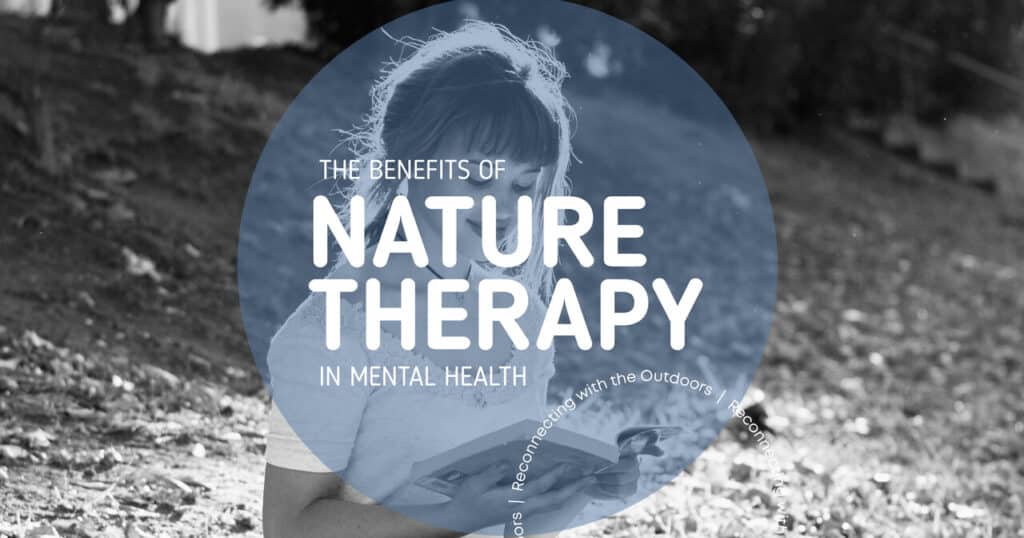Can nature heal me? If you are wondering if nature therapy is a legitimate option when it comes to mental healthcare, the answer is yes – your psychological and sometimes even physical concerns can be addressed through reconnecting with nature.
In our guide we will discuss the nature and mental health connection, provide you with suggestions on how to make the most of ecotherapy, and identify the ways to incorporate various outdoor activities into your daily routine. Invite your inner circle to come along with you on this journey and reap the benefits of nature therapy together through building closeness to each other and nature simultaneously.
What Is Nature Therapy?
Using nature to improve your mood and self-esteem, get rid of insomnia, and reduce the harmful impact of severe mental health disorders – this is an incomplete life of what nature therapy is capable of. Imagine taking a day off and visiting a park nearby, driving an hour to sit in front of the lake, or teaching yourself how to take care of the houseplant to see it grow and blossom – all these actions do not sound overwhelming yet the pleasure you can get from them is immeasurable.
No matter the season, you can find an activity to enjoy and feel closer to nature especially if you lost that connection over the years. As years go by and people get older and busier, they forget how fun it is to chill in the forest, lose yourself in a snowball fight, or dive in the river. Reduce your stress while your physical activity is increased by planning a hike, taking your family and friends to swim in a large body of water, or picking flowers to create a unique bouquet that will delight you for a while.
San Jose Mental Health
Key Benefits of Nature Therapy for Mental Health
Reduced Anxiety and Stress
The best way to relieve internal and external pressure on yourself is to stick to natural methods. Changes to your lifestyle can help massively, and this includes being outside – start running or exercising outside, go fishing or stargazing, and give back to nature by planting a tree.
Improved Mood and Emotional Balance
Whether you are struggling with random mood swings or you feel down even when nothing seems wrong, reconnecting with nature is a great way to get your feelings under control and cure the early signs of a potential mental illness.
Enhanced Mindfulness and Focus
Therapists recommend unplugging from time to regain your ability to concentrate – put down your phone, turn off the computer, and simply go outside to remind yourself the world outside of your academic and professional responsibilities as well as personal issues exists; moreover, it is beautiful.
Boosted Self-Esteem and Self-Perception
In case you feel down on yourself, your looks, and your personality, it can be beneficial to spend time with animals, go to a botanical garden, or exercise somewhere with a perfect view undisturbed by the signs of human presence.
Types of Nature Therapy Practices
Forest Bathing
One of the best places to improve your mindfulness and focus on your own well-being is the forest – disconnect from the loud world with all its distractions, allow yourself to slow down, and enjoy the time you spend surrounded by trees whether you are walking or meditating in the clearing.
San Jose Mental Health
Outdoor Adventure Therapy
Whether you are camping, hiking, stargazing, or cycling, any outdoor activity of this sort is beneficial both for your physical and mental wellness. Besides, you get to learn new expertize working with others while you are bonding and acquiring skills essential for survival in the wild.
Horticultural Therapy
It can be incredibly therapeutic to engage in gardening – this is a very calming activity that keeps you focused. If you have any mental or physical health issues, planting flowers, plants, and trees and taking care of them can support you in the long run.
Wilderness Therapy
This type of nature-based mental health treatment is perfect for children and adults alike – various outdoor expeditions can do wonders for mental health. Spending time together with your friends and peers while a licensed therapist oversees your behavior can lead to a major positive change in your demeanor.
Scientific Studies on Nature Therapy and Mental Health
Research shows various nature-associated health practices – from using gardening to cultivate wellness to recreational activities in nature to improve your physical fitness – definitely help people from all walks of life. You learn to cherish the world around you again and receive a solid reminder that the universe is vast and full of new experiences you can see, feel, smell, and taste.
Professional therapists suggest trying nature therapy for mental health – consult with the mental health provider of your choosing to figure out if ecotherapy can help in your particular case. Even if you prefer to handle stressful situations on your own without resorting to therapy, open up your mind to the benefits of nature therapy and see major improvements in your mental state in a few weeks or months.
Incorporating Nature Therapy into Daily Life
Sadly, it is not possible to go hiking every day but whether you have already discovered the pleasures of ecotherapy or you are only looking for ways to integrate it into your daily life, here are some tips on how to do that:
| Nature Therapy Practice | Description |
| Get Into Recycling | This could be the perfect way to give back to nature – from sorting out trash to reducing plastic waste, there are multiple ways to take care of the environment and feel like you are making a difference |
| Grow Plants at Home and in Your Office | It is an amazing feeling when you plant a seed and watch it transform into a beautiful plant day by day – boost your creativity and productivity by having a few indoor plants to look after |
| Spend More Time Outside | Do not wait for a day off or vacation to take a pleasant stroll in the park – at the very least, you can change the route you usually take to get to work or get outside with a book instead of sitting home staring at your phone |
Potential Limitations and Considerations
Nature can be rather cruel to inexperienced individuals – if you are going in the woods without preparation and realization of what may occur, it will not be an enjoyable activity; the best case scenario – you get bitten by mosquitoes and get a slight sunburn. Furthermore, people who spend a lot of time in nature need to show respect for the environment – you cannot pollute or waste natural resources for your own benefit only.
Additionally, do not forget about the dangers of nature if you are planning a retreat into the wilderness – do things you are mentally and most importantly physically capable of, map out the route, and warn others about your plans. Almost all nature-based activities require a certain level of fitness so whether you are gardening in your backyard or hiking in the mountains, be realistic about your aspirations and do not strain yourself trying to impress others.
Embracing Nature for Better Mental Health
When times get tough and you feel life has become monotonous and boring, it is wise to remember you can take a short or long break and spend it in nature. Taking care of your small garden, going for a walk in the woods, swimming in a pond or lake nearby, or arranging an outdoor adventure for yourself and your loved ones can be the remedy for you. The connection between mental health and being outdoors has been scientifically proven – “stop to smell the roses” are not just empty words. Make sure you take care of your own wellness and advise your friends and peers to expose themselves to natural environments more to take a step toward an enhanced quality of life.
San Jose Mental Health
FAQs
- What is nature therapy?
Nature therapy can be defined as a combination of treatment and techniques aimed to boost mental health. It includes both passive experiences such as taking a walk to inhale the scents of the forest and active experiences that require you to participate in some way whether you are climbing the hills or competing with a friend to see who can swim farther.
- How can ecotherapy help my mental health?
Whether you are struggling with mental disorders like sleep disturbances or depression or your goal is to prevent any mental health challenges before they even manifest, your quality of life will be improved when you connect with nature – let go of the harmful thoughts and relax outside.
- Do I need nature therapy?
Even if you are not facing any mental health challenges currently, prevention is the best medicine – every person can benefit from being in nature. Spend more time away from your house or office and you will notice major improvements in your mood.
- What are the most common ecotherapy practices?
Spending time outside surrounded by plants and trees, tending to gardens and flowers, enjoying the view of the lake, sea, or mountains – all these activities are easily accessible and even affordable so you can let nature take charge and heal you while you are simply existing.
- Can a therapist help me embrace the healing power of nature?
There are ecotherapists whose job is to bring patients closer to nature so if you discover you are struggling to connect with the world outside, it may be a good idea to book an appointment with an individual who can advise you properly.








